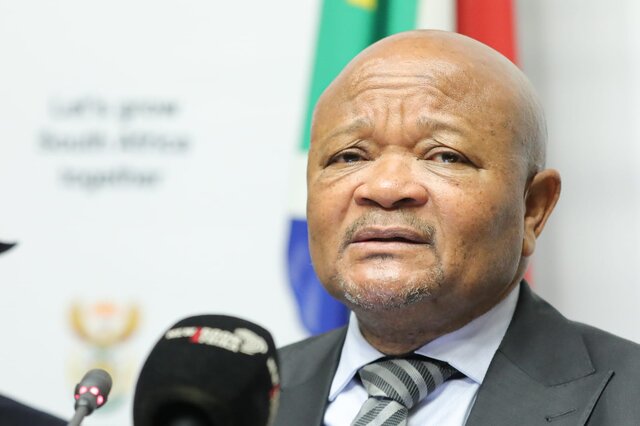Cape Town – Police Minister Senzo Mchunu on Friday unveiled a R120.89 billion budget for the South African Police Service (SAPS) for the 2025/26 financial year, promising a decisive shift in strategy to curb violent crime, root out corruption within the police, and modernise policing efforts nationwide.
Delivering his budget vote speech in the National Assembly, Mchunu outlined the government’s sharpened focus on high-contact crimes, gender-based violence and femicide (GBVF), gang violence, and organised crime.
He acknowledged that while the allocation was significant, it still fell short of the resources needed to match the evolving threat of crime in South Africa.
“The work that needs to be done far exceeds the resources available,” Mchunu said. “Crime is adaptive, dynamic and, in many cases, well-finance – and so must our response be.”
R120 billion budget to tackle crime hotspots
The lion’s share of the budget, over 53%, will go towards visible policing, while detective services will receive nearly 20%.
An additional R85 million has been earmarked for the country’s 35 most violent police precincts across Gauteng, KwaZulu-Natal, Western Cape, and Eastern Cape.
#PoliceMinistry [READ: BUDGET VOTE 2025/2026] Minister of Police, Mr Senzo Mchunu tables the 2025/2026 Budget Votes for the South African Police Service, Civilian Secretariat for Police Service and the Independent Police Investigative Directorate, outlining priorities for… pic.twitter.com/gSgQBMThrs
— SA Police Service 🇿🇦 (@SAPoliceService) July 4, 2025
The budget also includes:
-
R219.2 million for securing the G20 Summit in November,
-
R400 million for the 2026 Local Government Elections,
-
R1.6 billion for GBVF-related interventions, including FCS units,
-
R670 million for building and upgrading police stations.
Focus on gender-based violence and community policing
Mchunu said the ministry would intensify efforts to combat GBVF, a crisis he described as having reached “distressing levels.” The plan includes R1.5 billion for Family Violence, Child Protection and Sexual Offences (FCS) units and an additional R50 million to strengthen provincial responses.
Community policing forums (CPFs) will receive R28 million for tools like torches and reflective jackets, while R8.5 million will support community engagement events, including izimbizo and awareness campaigns.
In a significant admission, Mchunu confirmed the recent arrests of senior SAPS Crime Intelligence officials on corruption charges, asserting zero tolerance for malfeasance within the ranks.
“We have taken a defined stance against corruption within the SAPS. There is no tolerance for corruption,” he said.
To address morale and performance issues, the SAPS will implement various HR reforms, including:
-
A critical skills allowance of R1,000 per month for detectives from October,
-
The re-enlistment of 200 former detectives,
-
A new online recruitment system launched in June,
-
Training of 5,500 police trainees, with another cohort to begin in early 2026.
Mchunu also highlighted the SAPS’ modernisation agenda, with investments in body-worn cameras, drones, and digital tools to enhance operational efficiency.
Five automated police stations will be piloted in partnership with Business Against Crime South Africa, alongside expanded forensic labs and integrated data systems with the private sector.
“We need a whole-of-society approach to restore law and order and reclaim our streets,” Mchunu said.
Crackdown on Gangs, Drugs, and Illegal Mining
Gang violence remains a top concern, especially in Cape Town, where 18 murders were recorded in recent waves. Specialised units will be deployed in 225 identified hotspots, with intelligence-led operations expected to supplement ongoing efforts like Operation Shanela.
The SAPS has also committed to:
-
Reducing illegal firearms,
-
Disrupting drug networks,
-
Tackling corruption within its own ranks,
-
Fighting illegal mining.
The Directorate for Priority Crime Investigation (DPCI), or the Hawks, has been allocated R150 million over two years to support work with the Joint Initiative on Crime and Corruption. It will prioritise serious organised crime, cybercrime, and unresolved apartheid-era TRC cases.
As part of its expansion, the DPCI will recruit:
-
300 internal candidates for promotional posts,
-
250 new recruits with forensic, legal, and IT expertise,
-
85 externally advertised posts with another 175 to follow.
These steps, Mchunu said, are aligned with the Financial Action Task Force recommendations and will strengthen South Africa’s ability to investigate financial crimes.
Mchunu said the SAPS must evolve to meet the growing complexity of crime and pledged that his ministry would “lead a police service that protects the vulnerable, disrupts criminality, and restores trust”.
“There can be no development without safety, and no safety without an efficient police service,” he said.


